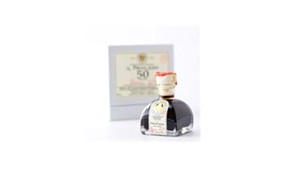The Different Types of Balsamic Vinegar

There are four types of balsamic vinegar available today
Artisan
This is authentic vinegar, made in the traditional “Tradizionale” way in the provinces of Modena and Reggio. It has been made for centuries and will have been tested and approved by the balsamic consortiums in these two regions. These vinegars carry the word “tradizionale” on their labels and come in very distinctive bottles. The Modenese vinegars are in a bulbous bottle designed by Giorgio Giugiaro, better known for his prestigious Maserati car designs. This type of vinegar is thick, luscious, dark purplish brown and aromatic, with sweet-and-sour notes in a harmonious blend. When you tip the bottle, the vinegar should coat the side of the glass. Because of their viscosity and intense flavour, tradizionales are meant to be used sparingly.
The gift of oil’s Vintage balsamic is made in the “Tradizionale” method, but is bottled here in the UK and is thus not considered a “Tradizionale” vinegar. We do sell 4 certificated “Tradizionale” balsamic vinegars, the Tradizionale (12 years old), the Extra Vecchio (25 years old), Il Privilegio (50 years old) and Grande Vecchio (100 years old).
Condimenti
These vinegars are made by producers who only use unadulterated cooked grape must and follow traditional artisan methods, but sell some of their product sooner than the legally required 12 years and so cannot be called tradizionale. This type of vinegar is still typically very good and, although still expensive, are a bargain compared to the price of a ‘tradizionale’ vinegar. They are very popular in Italy, but only small amounts are ever exported.
The gift of oil’s Classic and Reserve balsamics fall into this category.
Industriale
These are quickly made products, produced on a much larger scale and have other components added. At best these are pale facsimiles of the previous 2 styles of vinegar. They are not complex, but rather straightforward and acidic and best used for cooking.
Imitation
These are “make believe” balsamic vinegars and are generally made outside Modena and Reggio. Nevertheless, they are still normally marketed as aceto balsamico di Modena. These totally inferior imitations account for about 70% of the balsamic vinegar market! They do not contain any amount of balsamic or cooked grape must and are usually red wine vinegar diluted with water and made in a day. Cane sugar, caramel, vanilla, herbs and artificial thickeners are added to fake sweetness and depth.



